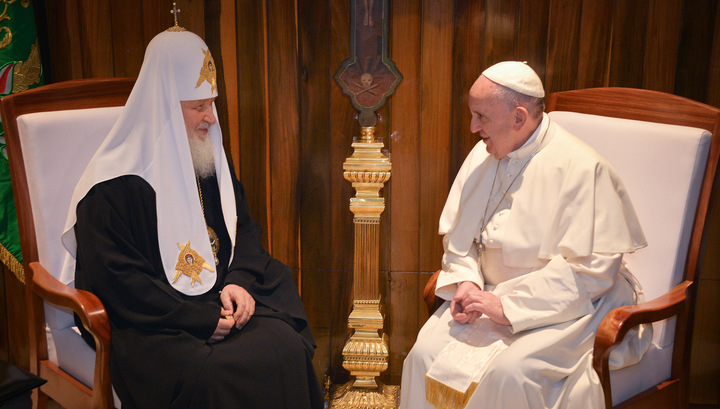“We must seek and grant forgiveness”

“We cannot maintain the fundamentalist view that our Orthodox Church is the only real church out there and that the rest of the world are sectarians and heretics who are simply outside the church.”
“Restoration of relations between Christian churches proceeds less from meetings between church leaders and more from a grassroots movement, and can be achieved through repentance and forgiveness,” said priest Georgy Kochetkov, Rector of St. Philaret’s Institute in Moscow, commenting on the meeting between the head of the Russian Orthodox Church and the Pope.
The first historic meeting between the Patriarch of Moscow and All Russia and the Pope was held on 12 February at Havana’s international airport. The meeting’s outcome was the signing of a Joint Declaration and hope for a new stage in the relations between the Russian Orthodox Church and the Roman Catholic Church.
Renouncing Fundamentalism
“I immediately welcomed this meeting,” said Father Georgy speaking at the Meeting of the Lord Council of the Transfiguration Brotherhood in his capacity as its spiritual director.
“This is an important issue and we are awaiting further steps towards unity, both mystical and spiritual as well as formal, including canonical, unity,” said the priest.
He nevertheless pointed out that “this new reality of church unity has to be broken into, which is hard to do”.
“On the one hand, we cannot neglect the existing canonical order, and on the other, we must obey God rather than men,” said Father Georgy.
Another consideration he mentioned was that “when meeting with non-Orthodox Christians, we cannot always reliably tell whether they are being guided by the Holy Spirit or simply taking diplomatic steps in line with their own policies. This is a very complex issue.”
“One thing is clear: we cannot maintain the fundamentalist view that our Orthodox Church is the only real church out there and that the rest of the world are sectarians and heretics who are simply outside the church. This is hypocrisy and a lie,” he emphasised.
Having said that, Father Georgy noted that the above view was rather widespread. “We often fail to respond to it because we do not know how to respond to this lie,” said Father Georgy noting that it was important to learn ways of doing that.
“Pope Francis recently declared in the presence of Ecumenical Patriarch Bartholomew that there was nothing preventing us from being in Eucharistic communion with each other. This is important. This was exactly what Patriarch Bartholomew wanted to hear but not something a great many Orthodox believers want to hear because their lives are still very much defined by old injuries,” said the priest.
He further noted that historically, “truth be told, there had been many regrettable injuries.” “Catholics certainly inflicted more injuries upon us than we did upon them but we were also guilty of inflicting injuries and on more than one occasion,” he added. “So we must seek each other’s forgiveness,” urged Father Georgy adding that this equally applied to protestants.
“Not only must we seek forgiveness but also grant it,” he noted.
The Head of the church is Christ, not the Pope or the Patriarch
In Father Georgy’s view, church unity “cannot be simply handed down but has to come from a grassroots movement”. “This is because the Holy Spirit acts more freely in God’s people than it does through church leadership who have to consider politics, financial supporters and a myriad of other issues that have very little to do with church life,” said the priest.
According to him, church unity “certainly does not proceed solely from leadership meetings, yet leadership meetings with all their political aspects and other considerations as well as the unavoidable, ever present historical inertia, are extremely significant”.
Father Georgy also placed an emphasis on “church leadership being somewhat like church government but not heads of the church”. “For Christ alone - not the Pope or the Patriarch - is the head of the church,” he pointed out.
Restoring the norm for church boundaries
Father Georgy sees the relations between the Catholic and the Orthodox Churches developing in “the only way possible: towards unity, since the universal church, i.e. the church of the faithful, must act in accordance with God’s will to ascertain and reinforce its boundaries”. “And we know that in one way or another these boundaries involve the Orthodox, the Catholic and protestant churches. This means that a canonical Church and the church as the Body of Christ have widely divergent boundaries,” he said.
“We are destined for unity. We must always realise that there are people with whom we are wholly united in Christ but who are part of a different canonical Church. And we ought to experience it as a personal pain that there is no formal unity between us and that, save for rare occasions, we cannot share the Holy Communion and be part of the same Eucharistic communion,” said the priest.
“However, by now we clearly know that not even united Eucharistic communion of Churches brings the whole church together. Eucharistic communion establishes the boundaries of the mysterial church. But it turns out that beyond the mysterial church there lies another, deeper-level reality, which is the mystical church,” concluded Father Georgy.